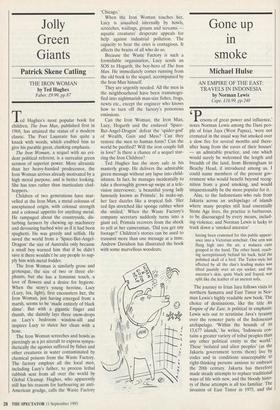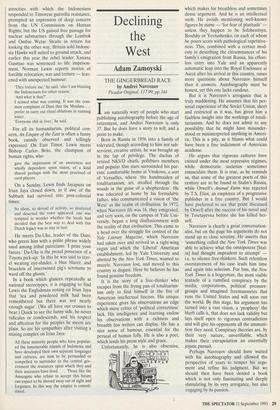Gone up in smoke
Michael Hulse
AN EMPIRE OF THE EAST: TRAVELS IN INDONESIA by Norman Lewis Cape, £16.99, pp.240 arsons of great power and influence,' notes Norman Lewis among the Dani peo- ple of Irian Jaya (West Papua), 'were not cremated in the usual way but smoked over a slow fire for several months and there- after hung from the eaves of their houses' — an admirable practice, and one which would surely be welcomed the length and breadth of the land, from Birmingham to Beachy Head, if introduced among us. I could name members of the present gov- ernment who would benefit beyond recog- nition from a good smoking, and would unquestionably be the more popular for it.
Alas, to the Indonesians who rule from Jakarta across an archipelago of islands where many peoples still lead essentially Stone Age lives, the practice is barbarous, to be discouraged by every means, includ- ing violence; and Norman Lewis is lucky to track down a 'smoked ancestor'
having been crammed for this public appear- ance into a Victorian armchair. One arm was flung high into the air, a malacca cane grasped in the hand. The other hand, reach- ing surreptitiously behind his back, held the polished skull of a bird. The Tudor-style hat affected by all the clan's leading males was tilted jauntily over an eye socket, and the ancestor's skin, quite black and frayed, was split like the leather of an ancient sofa.
The journey to Irian Jaya follows visits to northern Sumatra and East Timor in Nor- man Lewis's highly readable new book. The choice of destinations, like the title An Empire of the East, is political in emphasis: Lewis sets out to scrutinise Java's tyranny over the remoter parts of the Indonesian archipelago. 'Within the bounds of its 13,677 islands,' he writes, 'Indonesia con- tains a greater variety of tribal peoples than any other political entity in the world.' These 'isolated and alien peoples' (as the Jakarta government terms them) live by codes and in conditions unacceptable to right-thinking persons anxious to embrace the 20th century. Jakarta has therefore made steady attempts to replace traditional ways of life with new, and the bloody histo- ry of these attempts is all too familiar. The invasion of East Timor in 1975, and the
atrocities with which the Indonesians responded to Timorese guerrilla resistance, prompted an expression of deep concern from the UN Commission on Human Rights; but the US gained free passage for nuclear submarines through the Lombok and Ombai Wetar Straits in return for looking the other way, Britain sold Indone- sia Hawks well suited to ground attack, and earlier this year the rebel leader Xanana Gusmao was sentenced to life imprison- ment. Norman Lewis reports stories of forcible relocation, war and torture — leav- ened with unexpected humour:
'They torture me,' he said, 'also I am blaming the Indonesians for other reason.'
'And what is that?'
I sensed what was coming. It was the com- mon complaint of Dani that the Muslims . . . prefer to carry out ritual ablutions in running water.
'Everyone shit in river,' he said.
For all its humanitarian, political con- cern, An Empire of the East is often a funny book, cannily observed and tellingly expressed. On East Timor, Lewis meets Bishop Carlos Belo, the champion of human rights, who
gave the impression of an awareness not wholly dependent upon vision, of a kind shared perhaps with the most practised of card-players.
On a Sunday, Lewis finds Jayapura on Irian Jaya closed down, as if awe of the Sabbath had survived into post-colonial times:
So silent, so devoid of activity, so shuttered and deserted the town appeared, one was tempted to wonder whether the locals had decided that the best way to deal with this Dutch legacy was to stay in bed.
He meets Da-Uke, leader of the Dani, who greets him with a polite phrase widely used among tribal patricians: 'I prize your faeces.' Da-Uke is the proud possessor of a Toyota pick-up: 'In this he was said to trav- el wearing eye-shades, a blue blazer, and bracelets of intertwined pig's scrotums to ward off the ghosts.'
In a book which glances repeatedly at national stereotypes, it is engaging to find Lewis the Englishman noting on Irian Jaya that 'tea and powdered milk had been remembered but there was not nearly enough sugar'. (We all have our crosses to bear.) Quick to see the funny side, he never ridicules or condescends, and his respect and affection for the peoples he meets are plain. So are his sympathies after visiting a mining complex on Irian Jaya:
All these minority people who have populat- ed the innumerable islands of Indonesia and have developed their own separate languages and cultures, are now to be persuaded or compelled to surrender to the central gov- ernment the resources upon which they and their ancestors have lived.. . . Those like the Amungme who refuse to accept this future can expect to be shoved away out of sight and forgotten. In this way the empire is consoli- dated.



















































 Previous page
Previous page